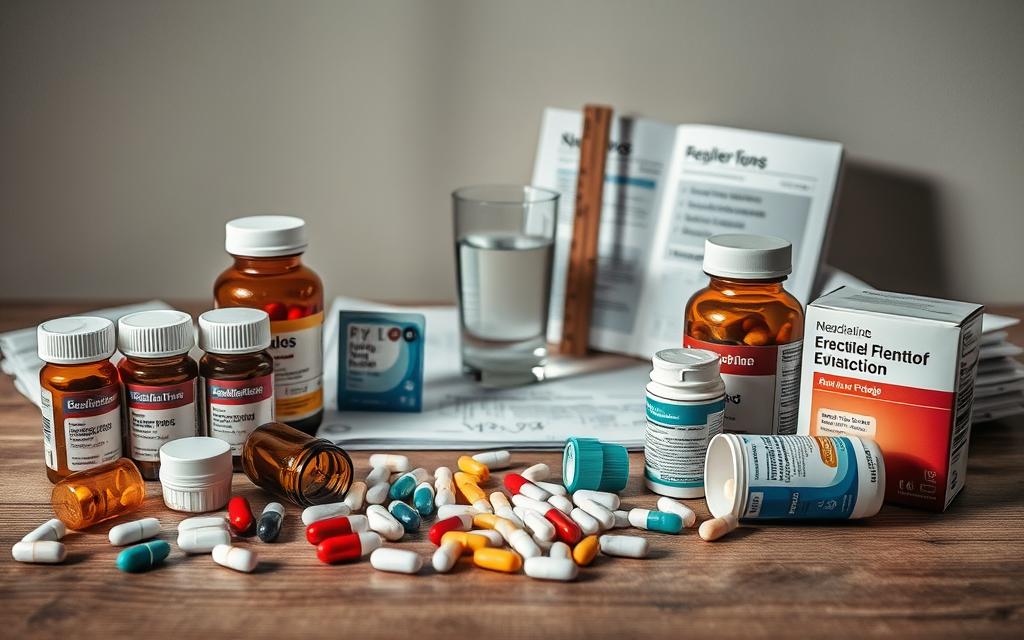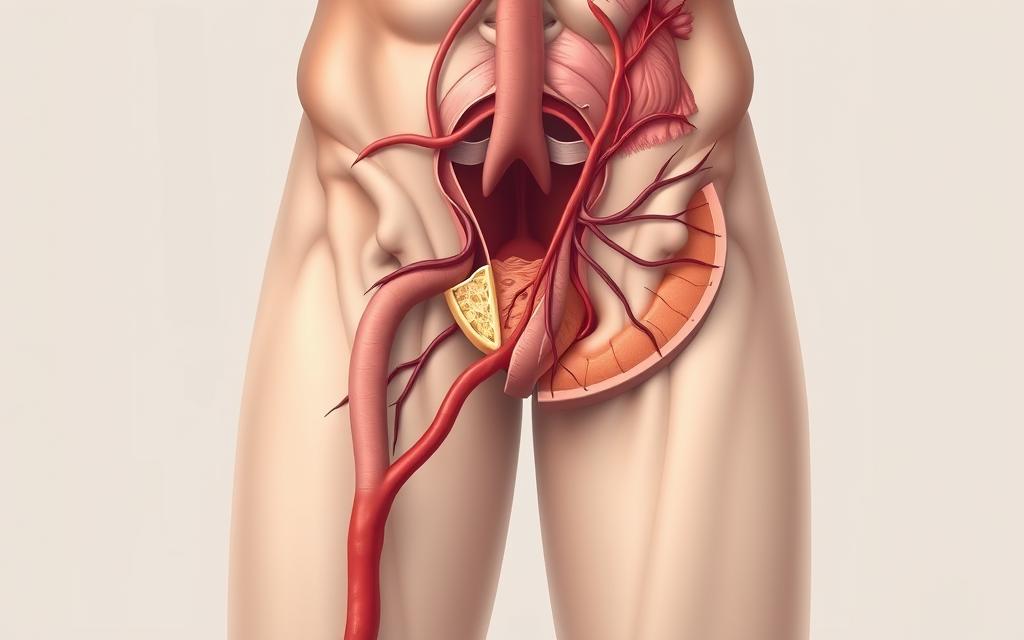Can Zinc Cause Erectile Dysfunction? Exploring the Impact on Male Health
Men’s health is a complex issue, and erectile dysfunction is a common concern that affects many. While various factors contribute to this condition, there’s growing interest in how certain medications impact male sexual health. Specifically, the relationship between hypertension medication and erectile dysfunction has sparked debate.
Hypertension, or high blood pressure, is a widespread condition that requires management, often through medication. However, some men have reported experiencing erectile dysfunction as a potential side effect of their treatment. Understanding this connection is crucial for men to make informed decisions about their health.
Exploring the link between hypertension treatment and male sexual health can provide valuable insights. It’s essential to consider the potential effects of medication on overall well-being, ensuring that treatments for one condition don’t adversely affect another aspect of health.
The Connection Between Cardiovascular Health and Sexual Function
The intricate relationship between cardiovascular health and sexual function is a critical aspect of men’s overall wellbeing. Cardiovascular health plays a crucial role in determining sexual function, as it directly affects blood flow and vascular health.
Maintaining healthy blood pressure is essential for optimal erectile function. When blood pressure is not well-managed, it can lead to erectile dysfunction (ED).
How Blood Pressure Affects Erectile Mechanics
Blood pressure has a direct impact on erectile mechanics. Healthy blood vessels are essential for achieving and maintaining an erection. When blood vessels are constricted or damaged due to high blood pressure, it can impede blood flow to the penis, making it difficult to achieve an erection.
Why Men with Hypertension Often Experience ED
Men with hypertension are more likely to experience erectile dysfunction due to the strain high blood pressure puts on blood vessels and the cardiovascular system. The resulting reduced blood flow and potential vascular damage can significantly impair erectile function.
| Condition | Impact on Erectile Function | Prevalence |
|---|---|---|
| Hypertension | Reduced blood flow, vascular damage | High |
| Normal Blood Pressure | Healthy blood flow, normal erectile function | Expected |
Understanding the link between cardiovascular health and sexual function can help men take proactive steps to maintain their overall health and wellbeing.
Can Blood Pressure Medicine Cause Erectile Dysfunction?
The relationship between blood pressure medication and erectile dysfunction is complex and multifaceted. While managing hypertension is crucial for overall cardiovascular health, some antihypertensive medications may have sexual side effects.

Common Antihypertensive Medications Associated with ED
Certain blood pressure medications have been linked to erectile dysfunction. These include:
- Beta-blockers, which can reduce blood flow
- Diuretics, particularly thiazide diuretics, that can affect hormone levels and blood flow
Not all blood pressure medications have the same risk of causing ED. Some, like calcium channel blockers and ACE inhibitors, are considered to have a lower risk or even potentially beneficial effects on erectile function.
Prevalence Rates and Clinical Studies
Clinical studies have investigated the prevalence of ED among men taking antihypertensive medications. A study published in the Journal of Clinical Hypertension found that the prevalence of ED varied among different classes of antihypertensive drugs.
| Medication Type | Prevalence of ED | Notable Effects |
|---|---|---|
| Beta-blockers | Higher | Reduced blood flow |
| Diuretics | Moderate | Hormonal changes |
| Calcium Channel Blockers | Lower | Potential vasodilatory benefits |
| ACE Inhibitors | Lower | Protective vascular effects |
Understanding the potential side effects of blood pressure medications on erectile function can help men and their healthcare providers make informed decisions about managing hypertension while minimizing the risk of ED.
Which Blood Pressure Medications Are Most Likely to Cause ED?
Blood pressure medications are essential for cardiovascular health, but some may increase the risk of erectile dysfunction. Different classes of antihypertensive drugs have varying effects on sexual function, making it crucial to understand these differences.
For men managing hypertension, it’s vital to balance cardiovascular health with sexual wellbeing. Certain blood pressure medications can impact erectile function, either by affecting blood flow, hormone levels, or neurological pathways. Learn more about the impact of blood pressure medication on erectile.
Beta-Blockers: Mechanism and Sexual Side Effects
Beta-blockers are a common class of antihypertensive medications that work by reducing the heart rate and the heart’s workload. However, they can have sexual side effects, including erectile dysfunction. Studies suggest that beta-blockers may decrease erectile function by reducing blood flow to the penis or affecting the nervous system’s control over erection.
Diuretics: Impact on Blood Flow and Hormones
Diuretics, another type of blood pressure medication, can also impact erectile function. They work by increasing urine production, which can lead to dehydration if not managed properly. Dehydration can reduce blood volume, potentially impairing blood flow to the penis. Additionally, certain diuretics can affect hormone levels, including testosterone, which plays a crucial role in sexual health.
Calcium Channel Blockers and ACE Inhibitors: Lower-Risk Options
In contrast to beta-blockers and diuretics, Calcium Channel Blockers and ACE Inhibitors are generally considered to have a lower risk of causing erectile dysfunction. Calcium Channel Blockers help relax blood vessels, improving blood flow, which can be beneficial for erectile function. ACE Inhibitors work by blocking the action of a natural chemical that narrows blood vessels, thereby lowering blood pressure and potentially improving erectile function.
| Medication Class | Mechanism | Impact on Erectile Function |
|---|---|---|
| Beta-Blockers | Reduce heart rate and workload | May decrease erectile function |
| Diuretics | Increase urine production | Can impair blood flow and hormone balance |
| Calcium Channel Blockers | Relax blood vessels | Generally lower risk of ED |
| ACE Inhibitors | Block chemical that narrows blood vessels | Lower risk of ED, potentially improves erectile function |
Understanding the different types of blood pressure medications and their potential effects on erectile dysfunction is crucial for men managing hypertension. By discussing these options with a healthcare provider, men can find a balance between controlling blood pressure and maintaining sexual health.
How Blood Pressure Drugs Affect Male Sexual Function
The impact of antihypertensive medications on male sexual health is a multifaceted issue, affecting vascular, neurological, and hormonal aspects. Understanding these effects is crucial for men managing hypertension.
Blood pressure medications can influence male sexual function in several ways. One of the primary concerns is their effect on blood flow, which is essential for erectile function. Certain antihypertensive drugs can reduce blood flow to the penis, making it difficult to achieve or maintain an erection.
Vascular Pathways and Reduced Blood Flow
Some blood pressure medications, such as beta-blockers, can affect vascular pathways, potentially leading to erectile dysfunction (ED). Research has shown that these medications can reduce blood flow, making it harder for men to achieve an erection.
| Medication Type | Effect on Blood Flow | Potential Impact on Sexual Function |
|---|---|---|
| Beta-Blockers | Reduced blood flow | Increased risk of ED |
| Diuretics | Variable effects | Possible hormonal changes |
| ACE Inhibitors | Minimal negative impact | Less likely to cause ED |
Neurological and Hormonal Interference
Besides vascular effects, some antihypertensive medications can interfere with neurological and hormonal pathways. For instance, certain diuretics can lead to changes in hormone levels, potentially affecting sexual desire and function.
It’s essential for men to discuss their medication regimen with their healthcare provider to understand the potential impacts on their sexual health and explore alternatives if necessary.

Managing Sexual Side Effects While Controlling Hypertension
Finding the right balance between controlling high blood pressure and minimizing its impact on sexual health is crucial. Men with hypertension often face challenges in managing their condition without exacerbating erectile dysfunction. Effective management involves a combination of open communication with healthcare providers, potential adjustments to treatment plans, and adopting healthier lifestyle choices.
Having an Honest Conversation with Your Healthcare Provider
The first step in managing sexual side effects is to have an open and honest conversation with your healthcare provider. Discussing the impact of hypertension treatment on sexual function can help identify potential solutions. Healthcare providers can offer guidance on hypertension treatment options that minimize sexual side effects.
Medication Adjustments and Alternative Treatments
In some cases, adjusting medications or exploring alternative treatments can help alleviate erectile dysfunction. For instance, switching from beta-blockers to calcium channel blockers or ACE inhibitors might reduce the risk of sexual side effects. Healthcare providers can help determine the most suitable treatment plan.
Lifestyle Modifications That Improve Both Conditions
Adopting healthier lifestyle choices can significantly improve both hypertension and erectile dysfunction. Regular exercise, a balanced diet, and stress management techniques can enhance overall cardiovascular health and lifestyle changes for better sexual health. Quitting smoking and limiting alcohol consumption are also beneficial. By making these changes, individuals can better manage their hypertension while reducing the risk of erectile dysfunction.
Managing erectile dysfunction and hypertension requires a comprehensive approach that includes medical treatment, lifestyle modifications, and open communication with healthcare providers. By working together with healthcare professionals and adopting healthier habits, men can effectively manage their condition and improve their overall quality of life.
Conclusion: Finding Balance Between Cardiovascular Health and Sexual Wellbeing
Managing hypertension is crucial for overall health, but it’s equally important to consider its impact on sexual function. Blood pressure medication can sometimes cause erectile dysfunction, creating a delicate balance between cardiovascular health and sexual wellbeing.
By understanding the complex relationship between hypertension treatment and erectile function, individuals can work with their healthcare providers to find alternative solutions. Lifestyle modifications, such as a balanced diet and regular exercise, can improve both conditions.
Balancing cardiovascular health and sexual wellbeing requires a collaborative effort between patients and healthcare providers. By being proactive about their health, individuals can minimize the risk of erectile dysfunction while managing hypertension, ultimately achieving a better quality of life.
